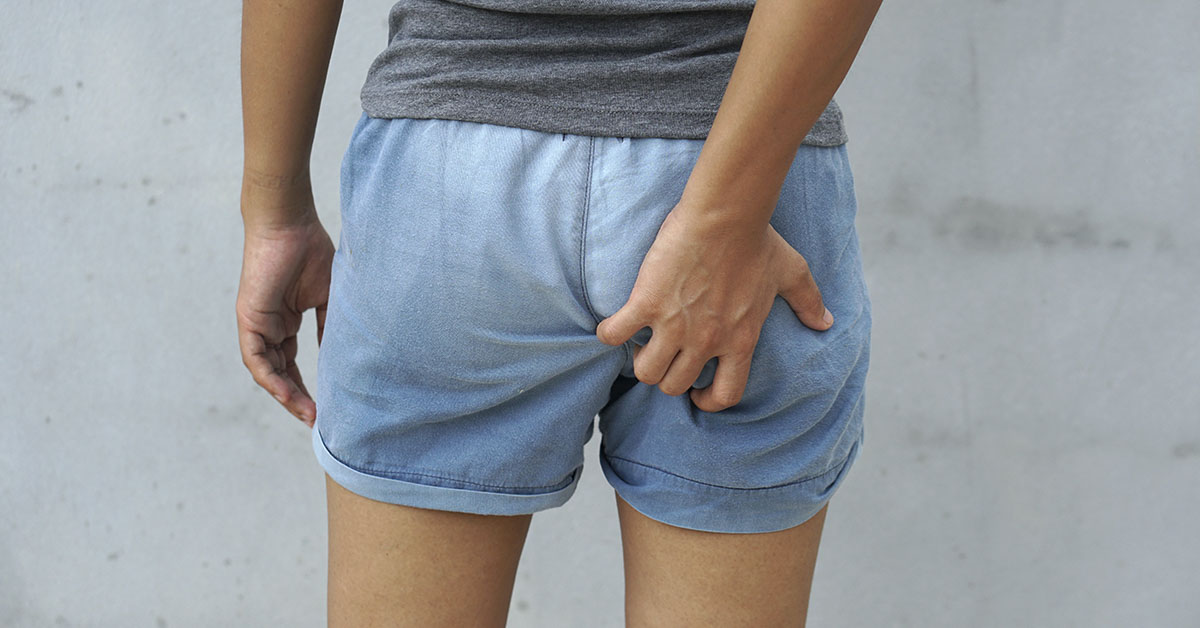No one likes having an itchy bum. It’s not only physically uncomfortable and annoying but mentally and emotionally. After all, there isn’t an easy way to scratch an itchy bum in public discreetly, leading to a lot of anxiety. Worse, it is an awkward thing to talk about, even to a health professional. While most of the causes of an itchy bum aren’t too big of a health concern, there does come a time when you really should see a doctor. This is everything you didn’t know you needed to know about what causes an itchy bum, also known as anal itching.
10 Common Causes of an Itchy Bum
Experiencing anal itching can be uncomfortable and distressing. It’s important to understand that anal itching, also known as pruritus ani, is usually a symptom of an underlying issue rather than a condition itself. Identifying the cause of your itchy bum is essential to finding relief. These are the ten most common reasons why you may be experiencing this and when it is advisable to seek medical attention. (1, 2)
1. Hygiene Issues
Improper wiping after a bowel movement can leave behind fecal matter and moisture. This leads to irritation and itching. On the other hand, excessive or harsh wiping can also cause irritation. Proper hygiene, such as using unscented toilet paper moistened with warm water and avoiding scented soaps, can help alleviate this problem.
2. Skin Conditions
Chronic skin conditions like psoriasis and anal eczema can cause inflammation and itching around the anus. Psoriasis manifests as red patches and silvery, flaky scales, while anal eczema is characterized by inflammation and severe itching. Dermatologists can prescribe medications and treatments to manage these conditions.
Read: 8 Home Remedies for Itchy Skin
3. Clothing
Tight-fitting or non-breathable clothing can create a warm and sweaty environment. This promotes bacterial growth and the resulting itching. Friction from clothing can also lead to inflamed hair follicles or folliculitis. Opting for loose-fitting, breathable clothing made from cotton can help prevent anal itching.
4. Food Irritants
Certain foods can contribute to an itchy bum by causing diarrhea or anal leakage. Examples include caffeine, carbonated beverages, citrus fruits, nuts, and spicy or acidic foods. Ensuring a balanced diet and avoiding known irritants may help alleviate symptoms.
5. Pinworms
Pinworms are a common cause of genital itching. These worms are easily transmitted through person-to-person contact or touching contaminated surfaces. Children are more susceptible to pinworm infections. Over-the-counter or prescribed oral medications can effectively eliminate pinworms.
6. Hemorrhoids or Anal Fissures
Hemorrhoids are swollen veins around the anus, often caused by straining during bowel movements or a low-fiber diet. Anal fissures are small tears in the anal lining caused by excess tension or lack of blood flow. Eating a fiber-rich diet, managing constipation, and topical treatments can help alleviate these conditions.
Read: Stop holding your farts in – here are 5 health benefits of passing gas
7. Yeast Infections
Yeast infections can occur in the perianal region due to Candida, a fungus that thrives in warm, moist environments. Tight-fitting clothing and weakened immune systems can increase the risk. Medications to treat Candida are available, and improving hygiene practices can help prevent recurrence.
8. Sexually Transmitted Infections (STIs)
Certain STIs, such as gonorrhea, herpes, and anal warts (caused by HPV), can cause anal itching. Symptoms typically occur around the anus, especially in individuals engaging in anal sex. Treatment options vary based on the specific STI and may include antiviral creams, cryotherapy, or surgery.
9. Scabies
Scabies is a highly contagious skin condition caused by the human itch mite. It can cause itching and rashes throughout the body, including the anal and genital areas. Prescription medications are necessary to treat scabies effectively.
10. Chronic and Systemic Diseases
Underlying health conditions like diabetes and autoimmune diseases can weaken the immune system, making individuals more susceptible to infections and itching. Proper management of the underlying condition is crucial for relieving anal itching in these cases.
When to See a Doctor
While many cases of an itchy bum can be managed with self-care measures, it is important to consult a doctor if:
- The itching persists for an extended period or becomes increasingly severe.
- The itching is accompanied by bleeding, discharge, or changes in stool color.
- There are signs of infection, such as pus or foul smell.
- The itching interferes with your daily activities and quality of life.
Remember, a healthcare professional can provide an accurate diagnosis and recommend appropriate treatment options based on your specific condition. Anal itching can be caused by various factors, ranging from hygiene issues and skin conditions to infections and underlying diseases. Understanding the root cause of your itchy bum is key to finding relief. By following proper hygiene practices, seeking medical advice when necessary, and addressing any underlying conditions, you can effectively manage and alleviate this condition.
Keep Reading: Woman’s Itchy, ‘Velvety’ Palms Turn Out to be Cancer Symptom
Sources
- “Anal Itching (Pruritus Ani).” Cleveland Clinic
- “11 Reasons You Might Have an Itchy Butt—And How To Treat It.” Health. Amanda MacMillan. March 3, 2023.

